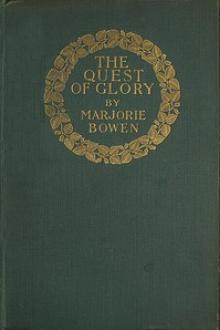The Quest of Glory by Marjorie Bowen (book recommendations based on other books .txt) 📕

- Author: Marjorie Bowen
- Performer: -
Book online «The Quest of Glory by Marjorie Bowen (book recommendations based on other books .txt) 📕». Author Marjorie Bowen
promotion is slow. But M. de Biron told me he had no fault to find with
you.”
Luc sat silent. He was gazing intently at the fine figure and noble face
of the old man in his murrey-coloured velvet and delicate lawn cravat,
powdered peruke, and long embroidered satin waistcoat, his firm right
hand with the white cornelian signet ring that rested on the table. His
delicate features and steady eyes, his pose and movements were all
instinct with tradition, nobility of race, and nobility of nature. He
belonged to the pure stock of the provincial aristocracy that had never
waited at any court or been favoured by any king, but who had been
“grand seigneur” at the time of the Crusades.
The younger brother was like him and like Luc: sweetness and dignity
mingled in his features. He was dressed richly, but far from
extravagantly, and in a fashion some years old.
His handsome brown hair hung in natural curls round his face, unconfined
by any ribbon. His expression was at once more simple and less ardent
than that of the young captain, at whom he gazed with affection,
respect, and admiration.
Luc looked from one to the other of these two fair faces, both so serene
and loving in expression, and the paleness of his countenance increased,
a lustre as of tears came into his eyes. He put his hand on to his
father’s and clasped it so firmly that the signet ring was pressed into
his palm.
“No, not now,” he said—“not now.”
“What not now?” smiled the old Marquis.
“That is all I have to say, Monseigneur,” replied Luc, with a sudden air
of weariness. “Tell me what has happened in Provence.”
He turned his eyes on Joseph, who blushed and declared humbly that the
news of Aix was not worth offering to one who had seen Paris and foreign
countries.
“But heretics are spreading ever among us,” put in the older M. de
Vauvenargues. “And we very often hear the pernicious name of Voltaire.”
The captain’s hazel eyes dropped; he held his father’s hand even more
firmly.
“If there is a man who should be burnt in the marketplace it is M. de
Voltaire,” continued the old Marquis. “He and his books and his
doctrines burnt—together.”
Luc removed his hand and rose; he asked if his mother would not soon
return, then raised his hitherto untouched glass of amber white wine and
drank it slowly. Joseph had a delicate feeling that his brother would
like to be alone with their father.
“I will see if your chamber is set,” he excused himself, and left them
quietly.
The Marquis was following him, but Luc set down his glass sharply and
said, “Father!”
The old man turned. He thought that this was the explanation of the “not
now” of Luc. He closed the door and returned to the table.
Luc stood with his head a little bent on his bosom, the sun, that
filtered through the beech leaves without, setting his silver broideries
aquiver with light and sparkling in the loosened threads of his brown
locks.
“My poor boy,”—his father took him gently by the shoulders—“you are
ill.”
Luc raised steady and beautifully smiling eyes. “No, Monseigneur, not
ill.” He paused a moment, then added, “But not strong—not strong enough
for a soldier.”
The Marquis did not comprehend. Luc laid his hands on his father’s
breast and a look of faintness came over his face, but his eyes glowed
more ardent and brilliant than ever.
“I must leave the army, father. I must send in my resignation to-night.
Bohemia broke my health. France—France has no further need of me.”
“Luc!”
The old man stepped back and stood rigid, as if the words were so many
arrows to pinion him.
The young soldier took hold of the back of the dark mahogany chair in
which he had been sitting.
“Monseigneur,” he said with great sweetness, “I am a disappointment to
you that must be hard to bear…I have been nine years in the army and
am no more than captain. I must now leave this honourable employment
with ruined health and a ruined fortune.”
The Marquis stood without movement. Luc proceeded to tell him, gently
and with courage, of the great expenses of the war, of his illness at
Eger, of the necessity he had been under of parting with most of his
property in Paris to meet his debts, of the doctor’s advice that the
bitter hardship of the retreat from Prague had sown the seeds of
perpetual weakness and suffering in his breast.
“But I shall live many years,” he finished, “and there are other ways of
glory.”
With these simple words was the tale told of his life’s hopes, his
dearest dreams utterly vanquished by brutal circumstance. Even his
father did not know what ambitions he had warmed in his heart only a few
months ago; even his father did not know from what horrors of despair he
had won his lofty sweetness of acceptance.
“You must not grieve, Monseigneur—soldiers expect such fates, and I—”
Then quite suddenly his voice failed him, and he turned away his head,
almost violently, and gazed at the placid gardens and the gorgeous beech
tree.
The Marquis’s chin sank on his bosom; he also had had his secret dreams
that he was now called upon to relinquish. This was his favourite son
standing before him and saying he was a useless invalid. “A useless
invalid “—the words surged up in the old noblels throat till he felt as
if he had spoken them.
“Forgive me,” he muttered; “I was not expecting this—no, not expecting
this.” He raised his head and said in a firmer voice, “M. de Caumont
would be glad to be speaking to his son on any terms. I must not be
ungrateful—no, I must not be ungrateful.”
Luc turned towards his father eyes that seemed to have widened and
darkened. “I have thought of that,” he replied. “I once indeed wished to
die as Hippolyte and M. d’Espagnac, but I felt—” He paused again; a
certain diffidence that had always made him reserved and a true modesty
prevented him from uttering his deep conviction of gifts—nay,
genius—that must yet find expression and recognition.
No such thought consoled the old Marquis. He saw his son’s career broken
at the beginning and his son’s fortune lost. He was not himself a
wealthy man; he could do little more than give him a home—and it was an
inglorious end.
But the noble rallied.
“Your mother will be glad,” he said, with a pathetic smile. “I think she
has not had an easy moment since you went to the war.”
Luc could not answer. He saw that his father was looking not at him, but
at the famous uniform of the régiment du roi that he wore, and, like a
picture suddenly thrust before his eyes, came the long-forgotten
recollection of the day his father had bought him his commission and of
their mutual pride in the trappings and symbols of war: there had been a
de Clapiers in the army for many hundred years. Thinking of this, and
seeing the old man’s wistful glance, Luc felt the bitterness that had
smitten him on his sick couch at Eger re-arise in his heart.
“My God!” he cried softly, “it is hard to be a useless man.”
He kissed his father’s hand, and then went up softly to that chamber he
had left nine years ago in a tumult of glorious anticipation, of surging
ambitions, of pure resolutions. The anticipations had been disappointed,
the ambitions had ended, but the resolutions had been kept. Luc de
Clapiers had done nothing since he had left his boyhood’s home of which
any man could be ashamed.
He thought of his mother as he entered the room, for she had promised to
leave it untouched for him, and he saw at once how lovingly she had kept
her word. Certainly, the red and gold hangings on the bed and the
windows had been removed, but carefully preserved, for the servants had
already brought them out and laid them across the cabinet by the
window—the beautiful curved bow-window with the latticed panes bearing
the little coat of arms in each in leaded, coloured glass.
There were his chairs, his books, his candlesticks, his low, wide bed
with the four carved posts, his crucifix, his picture of St. Cecilia
with her music from the Italian, even his violin and his old torn papers
in a green portfolio. He went round the room, vaguely touching these
objects that were free even from a speck of dust.
Only one thing was missing—a wooden figure of St. George that had stood
on a bracket in the corner. Luc had been fervently religious in his
youth and passionately devoted to this image that he had even wished to
take to the army with him. His mother, he remembered, had never liked
this figure, which she had declared uncouth and hideous. Now, it seemed,
she had taken her revenge, for the bracket was empty.
Luc went to the window, where the chestnut leaves were peering against
the pane. The green of them, with the sun behind, was translucent as
jade, and the workmanship of the white curling flowers seemed a beauty
beyond bearing.
As Luc looked at them he took off his sword, his sash, his scarf, his
coat, and laid them across the old wand-bottomed chair in the
window-seat.
Then he crossed to the square tortoiseshell-framed mirror that hung by
the bed and looked at himself in the murky, greenish glass.
No longer a soldier…he had taken off his uniform for the last time. He
stood the same as when he had last left this chamber, save that it was
then all before him, now all behind. He gazed at his own face, white
above the white shirt, still noble and pleasing, still young, but frail
and wasted and sad.
Instinctively he turned, as he had done in his childish troubles, to the
corner where St. George had stood. The loss struck him afresh as he, for
a second time, beheld an empty bracket, and was symbolic also, for he
had travelled far from the help of Christianity since he used to pray to
St. George; yet the vacant place smote him. He turned at the opening of
the door; a woman came towards him speechlessly, her lips moving and her
eyes full of a kind of trembling light.
He sprang to meet her and clasped her strongly; she thrust into his arms
what seemed a lump of wood.
“Safe, dear, safe. Did you think I had destroyed it?” she managed to say.
He kissed her cheek and then her hands. She began crying with pleasure.
“St. George, Luc,” she murmured. “I have kept him very carefully.”
The young soldier looked at the idol of his childhood; his emotions
reached the unbearable agony caused by dim recollections the hand of
tenderness beckons from the past. He laid St. George on the bed.
“Oh, my mother!” he cried, in a sinking voice. He fell on his knees,
hid his face, and wept.
CHAPTER VIII # CLÉMENCE DE SÉGUY
August had scorched the chestnut leaves and September withered them into
golden scrolls, and still Luc de Clapiers remained idle, but with a
burning heart, in the quiet home at Aix.
On a certain afternoon, when he was alone in his chamber writing, the
need for action, the thirst for fame blazed up through his sweet, vain
resignation beyond his power to restrain. The glory that he had set





Comments (0)